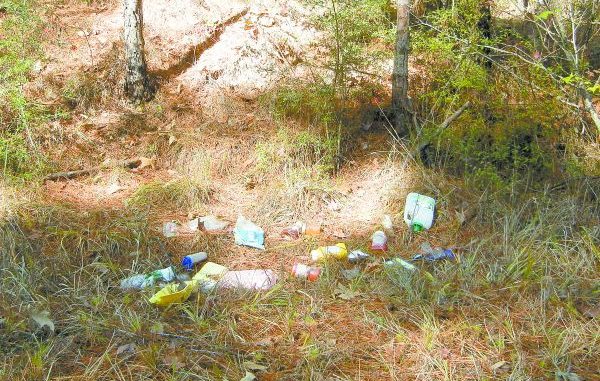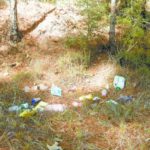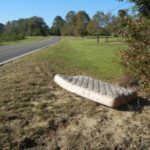
Keeping Sportsman’s Paradise beautiful
Illegal dumping of trash is an aspect of law enforcement where wildlife enforcement agents excel. This is true for a number of reasons.
For one, agents spend a good bit of time hidden away in remote places looking for illegal activity. Those remote places are not only good poacher territory, but they are also prime illegal dump sites.
Public lands such as wildlife management areas and national forests are most vulnerable because they are easily accessed, and have plenty of roads and trails leading to out-of-the-way locations.
Those locations give the offender just what he is looking for: a spot hidden from view, where the illicit load can be dumped at leisure and without immediate detection.
After all, it takes time to dump a big load of trash.
One such case came about several years ago while I was visiting a friend. I was off duty at the time and sitting in my personal vehicle in the friend’s driveway.
While we were talking, a car towing a trailer with a load of trash went by. My friend commented that the driver was without a doubt going to illegally dump the trash.
He said a dead-end Forest Service road ran into the woods in the direction the driver was headed; the road was frequently used as a dump site.
I decided to investigate, and after giving the suspect time to arrive at his location and start off-loading, I drove down the Forest Service road.
Sure enough, the car and trailer were parked on the road, and the driver was throwing the trash off the trailer.
It looked like he was remodeling a bathroom, since the items included old building materials, a sink and a toilet.
I identified myself, asked for his driver’s license and advised him he was in violation. After recording his information and explaining that he could expect a summons to Federal Court for illegal dumping, I told him it would be in his best interest to pick up what he had dumped and remove it from the national forest.
He gave me a strange look and asked, “Well, what am I supposed to do with it?”
I told him, “Do what I do: take it to the landfill during business hours, pay the fee and dispose of it legally.”
Let’s hope he did so.
Public camping areas such as those found on WMAs are also favorite dumping grounds.
Many of the camping areas have garbage cans or dumpsters adequate to handle trash disposed of by campers. But they are frequently found overflowing with household garbage from nearby residential homes, hauled there and dumped by homeowners who would rather dump illegally than pay for garbage pick up.
Primitive camping areas, where users are asked or expected to remove their own trash, get hit hard as well.
I hope everyone is more environmentally conscious these days. But years ago, when I was still a young agent, such was not always the case.
One morning while on patrol, I arrived at a combination boat landing and primitive camping area on a WMA. A group of four or five men were breaking camp and preparing to leave after an overnight fishing and camping trip at the location.
They were a friendly and talkative group. During our conversation, one of the men was busily picking up their trash and placing it in a large garbage bag.
After completing the job he tied the bag closed. As I watched, he went over and tucked the bag neatly away under a bush. He then turned, looked at me proudly.
“You see! If everyone did that we wouldn’t have trash all over the place,” he said.
All his buddies rushed over at once, grabbing up the bag and explaining to him that proper disposal would include taking the bag out with them.
I had to laugh — just could not help it. He had every good intention, but simply did not know better.
But most do know better, and some seem to take delight in flagrant violation of dumping laws.
In one such case, another agent and I were out early one morning investigating a closed-season hunting report. We had our patrol truck well concealed in the woods and were standing outside listening for a shot or any other suspicious sound.
We heard a vehicle approaching our location out on the road. As we listened, the vehicle slowed to a stop not far from us.
Suspecting this could be our poacher either being dropped off or picked up, we slipped up to the side of the road and looked for the suspect vehicle.
There it was out on the road. It was a pickup truck, and the driver was standing up in the truck-bed tossing trash to the ground.
We ran for our truck, fired it up and turned out on the road with emergency lights flashing, while the violator — a middle-aged man — stood frozen in surprise.
We stopped near the front of his truck and stepped out. He had been tossing his household garbage onto a driveway leading to a gate, and it was apparently not the first time this spot had been used as a dump site.
A parish police jury sign reading “No Dumping, $$$ Fine” was posted on the driveway.
While we were writing out his citation, several of the neighbors began driving by on the way to work. He asked if we would turn off the emergency lights because this was “embarrassing.”
We did not. Traffic safety considerations, you understand.
As stated at the beginning of the column, wildlife agents excel at litter enforcement. They work in the right places at the right times and take a keen interest in suspicious vehicle movement.
But, perhaps more importantly, they are a little more environmentally conscious than other law enforcement officers. So litter enforcement is taken seriously.
Consider also that WMAs and many other public outdoor recreational areas are administered by or funded through the Louisiana Department of Wildlife and Fisheries. No one wants to go to a public hunting or fishing area and have the experience ruined by the sight and smell of garbage. And clean up is very costly, eating away at taxpayer dollars better spent on fish and wildlife management projects.
Wildlife agents’ efforts and enthusiasm for litter enforcement have not gone unnoticed. Keep Louisiana Beautiful, a statewide anti-littering organization, has frequently recognized and awarded those efforts. Other state and local law enforcement agencies have also been recognized by KLB, not only for litter enforcement but for clean up operations and educational efforts, as well.
I recently spent a couple of weeks hunting in Wyoming and Colorado. In the Buffalo, Wyoming, area, numerous wells had been drilled in search of coal methane gas in recent years. Exploration has been completed and the companies have moved on.
But cleanup efforts have been so thorough and effective it was hard to tell anything ever happened. No trash piles, empty plastic buckets, discarded parts or tires can be found anywhere.
But I did find (and pick up) six empty beer bottles and the cardboard six-pack carton at a public parking lot for a state managed walk-in hunt area.
It was the only evidence of littering found in several remote places we visited.
In Colorado, we drove miles and miles of Bureau of Land Management and U.S. Forest Service roads without ever finding an illegal dump site. No washing machines, old furniture or bags of household garbage on all those lonely stretches. And I looked, expecting to find one around every turn.
Nope, not a thing.
But this morning I turned from my driveway onto the state highway and did not get 200 yards up the road before finding an old bed mattress dumped at roadside in very plain view.
I was on my way to a friend’s house, and while driving through the National Forest, I spotted a busted bag of household garbage scattered in what would otherwise be very pretty fall woods.
So we still have a ways to go here in the Sportsman’s Paradise. I urge every law enforcement agency to partner with the LDWF Enforcement Division to vigorously enforce litter laws.
And I urge everyone else to support education and clean up efforts at every opportunity.




